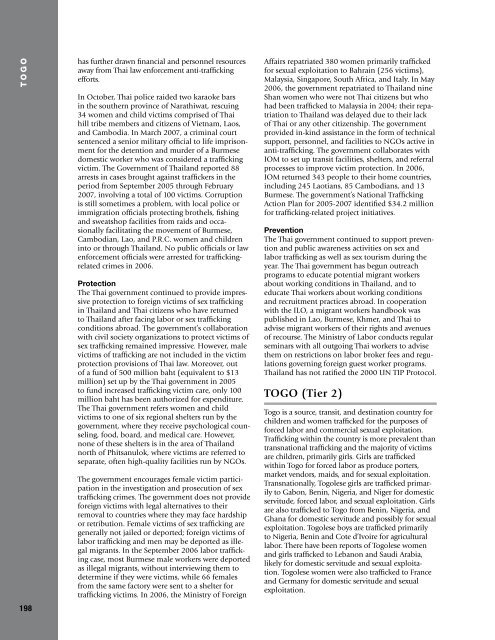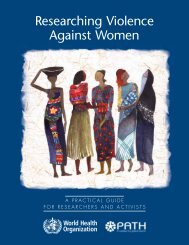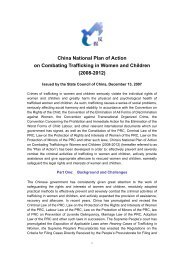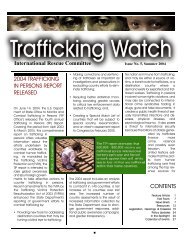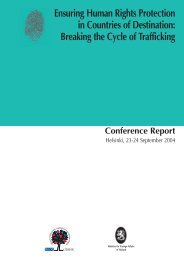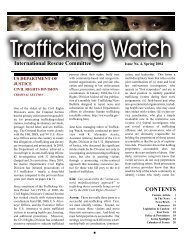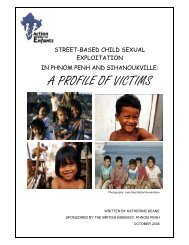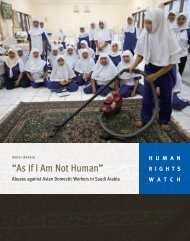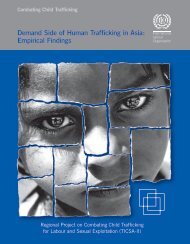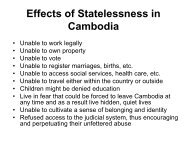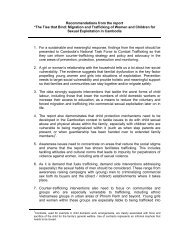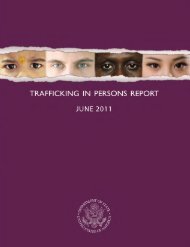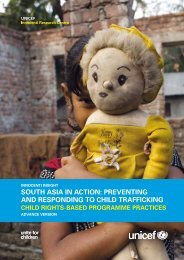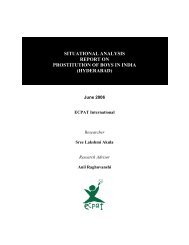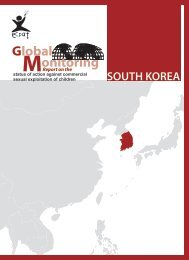2007 Trafficking in Persons Report - Center for Women Policy Studies
2007 Trafficking in Persons Report - Center for Women Policy Studies
2007 Trafficking in Persons Report - Center for Women Policy Studies
Create successful ePaper yourself
Turn your PDF publications into a flip-book with our unique Google optimized e-Paper software.
T O G O<br />
198<br />
has further drawn f<strong>in</strong>ancial and personnel resources<br />
away from Thai law en<strong>for</strong>cement anti-traffick<strong>in</strong>g<br />
ef<strong>for</strong>ts.<br />
In October, Thai police raided two karaoke bars<br />
<strong>in</strong> the southern prov<strong>in</strong>ce of Narathiwat, rescu<strong>in</strong>g<br />
34 women and child victims comprised of Thai<br />
hill tribe members and citizens of Vietnam, Laos,<br />
and Cambodia. In March <strong>2007</strong>, a crim<strong>in</strong>al court<br />
sentenced a senior military official to life imprisonment<br />
<strong>for</strong> the detention and murder of a Burmese<br />
domestic worker who was considered a traffick<strong>in</strong>g<br />
victim. The Government of Thailand reported 88<br />
arrests <strong>in</strong> cases brought aga<strong>in</strong>st traffickers <strong>in</strong> the<br />
period from September 2005 through February<br />
<strong>2007</strong>, <strong>in</strong>volv<strong>in</strong>g a total of 100 victims. Corruption<br />
is still sometimes a problem, with local police or<br />
immigration officials protect<strong>in</strong>g brothels, fish<strong>in</strong>g<br />
and sweatshop facilities from raids and occasionally<br />
facilitat<strong>in</strong>g the movement of Burmese,<br />
Cambodian, Lao, and P.R.C. women and children<br />
<strong>in</strong>to or through Thailand. No public officials or law<br />
en<strong>for</strong>cement officials were arrested <strong>for</strong> traffick<strong>in</strong>grelated<br />
crimes <strong>in</strong> 2006.<br />
Protection<br />
The Thai government cont<strong>in</strong>ued to provide impressive<br />
protection to <strong>for</strong>eign victims of sex traffick<strong>in</strong>g<br />
<strong>in</strong> Thailand and Thai citizens who have returned<br />
to Thailand after fac<strong>in</strong>g labor or sex traffick<strong>in</strong>g<br />
conditions abroad. The government’s collaboration<br />
with civil society organizations to protect victims of<br />
sex traffick<strong>in</strong>g rema<strong>in</strong>ed impressive. However, male<br />
victims of traffick<strong>in</strong>g are not <strong>in</strong>cluded <strong>in</strong> the victim<br />
protection provisions of Thai law. Moreover, out<br />
of a fund of 500 million baht (equivalent to $13<br />
million) set up by the Thai government <strong>in</strong> 2005<br />
to fund <strong>in</strong>creased traffick<strong>in</strong>g victim care, only 100<br />
million baht has been authorized <strong>for</strong> expenditure.<br />
The Thai government refers women and child<br />
victims to one of six regional shelters run by the<br />
government, where they receive psychological counsel<strong>in</strong>g,<br />
food, board, and medical care. However,<br />
none of these shelters is <strong>in</strong> the area of Thailand<br />
north of Phitsanulok, where victims are referred to<br />
separate, often high-quality facilities run by NGOs.<br />
The government encourages female victim participation<br />
<strong>in</strong> the <strong>in</strong>vestigation and prosecution of sex<br />
traffick<strong>in</strong>g crimes. The government does not provide<br />
<strong>for</strong>eign victims with legal alternatives to their<br />
removal to countries where they may face hardship<br />
or retribution. Female victims of sex traffick<strong>in</strong>g are<br />
generally not jailed or deported; <strong>for</strong>eign victims of<br />
labor traffick<strong>in</strong>g and men may be deported as illegal<br />
migrants. In the September 2006 labor traffick<strong>in</strong>g<br />
case, most Burmese male workers were deported<br />
as illegal migrants, without <strong>in</strong>terview<strong>in</strong>g them to<br />
determ<strong>in</strong>e if they were victims, while 66 females<br />
from the same factory were sent to a shelter <strong>for</strong><br />
traffick<strong>in</strong>g victims. In 2006, the M<strong>in</strong>istry of Foreign<br />
Affairs repatriated 380 women primarily trafficked<br />
<strong>for</strong> sexual exploitation to Bahra<strong>in</strong> (256 victims),<br />
Malaysia, S<strong>in</strong>gapore, South Africa, and Italy. In May<br />
2006, the government repatriated to Thailand n<strong>in</strong>e<br />
Shan women who were not Thai citizens but who<br />
had been trafficked to Malaysia <strong>in</strong> 2004; their repatriation<br />
to Thailand was delayed due to their lack<br />
of Thai or any other citizenship. The government<br />
provided <strong>in</strong>-k<strong>in</strong>d assistance <strong>in</strong> the <strong>for</strong>m of technical<br />
support, personnel, and facilities to NGOs active <strong>in</strong><br />
anti-traffick<strong>in</strong>g. The government collaborates with<br />
IOM to set up transit facilities, shelters, and referral<br />
processes to improve victim protection. In 2006,<br />
IOM returned 343 people to their home countries,<br />
<strong>in</strong>clud<strong>in</strong>g 245 Laotians, 85 Cambodians, and 13<br />
Burmese. The government’s National <strong>Traffick<strong>in</strong>g</strong><br />
Action Plan <strong>for</strong> 2005-<strong>2007</strong> identified $34.2 million<br />
<strong>for</strong> traffick<strong>in</strong>g-related project <strong>in</strong>itiatives.<br />
Prevention<br />
The Thai government cont<strong>in</strong>ued to support prevention<br />
and public awareness activities on sex and<br />
labor traffick<strong>in</strong>g as well as sex tourism dur<strong>in</strong>g the<br />
year. The Thai government has begun outreach<br />
programs to educate potential migrant workers<br />
about work<strong>in</strong>g conditions <strong>in</strong> Thailand, and to<br />
educate Thai workers about work<strong>in</strong>g conditions<br />
and recruitment practices abroad. In cooperation<br />
with the ILO, a migrant workers handbook was<br />
published <strong>in</strong> Lao, Burmese, Khmer, and Thai to<br />
advise migrant workers of their rights and avenues<br />
of recourse. The M<strong>in</strong>istry of Labor conducts regular<br />
sem<strong>in</strong>ars with all outgo<strong>in</strong>g Thai workers to advise<br />
them on restrictions on labor broker fees and regulations<br />
govern<strong>in</strong>g <strong>for</strong>eign guest worker programs.<br />
Thailand has not ratified the 2000 UN TIP Protocol.<br />
TOGO (Tier 2)<br />
Togo is a source, transit, and dest<strong>in</strong>ation country <strong>for</strong><br />
children and women trafficked <strong>for</strong> the purposes of<br />
<strong>for</strong>ced labor and commercial sexual exploitation.<br />
<strong>Traffick<strong>in</strong>g</strong> with<strong>in</strong> the country is more prevalent than<br />
transnational traffick<strong>in</strong>g and the majority of victims<br />
are children, primarily girls. Girls are trafficked<br />
with<strong>in</strong> Togo <strong>for</strong> <strong>for</strong>ced labor as produce porters,<br />
market vendors, maids, and <strong>for</strong> sexual exploitation.<br />
Transnationally, Togolese girls are trafficked primarily<br />
to Gabon, Ben<strong>in</strong>, Nigeria, and Niger <strong>for</strong> domestic<br />
servitude, <strong>for</strong>ced labor, and sexual exploitation. Girls<br />
are also trafficked to Togo from Ben<strong>in</strong>, Nigeria, and<br />
Ghana <strong>for</strong> domestic servitude and possibly <strong>for</strong> sexual<br />
exploitation. Togolese boys are trafficked primarily<br />
to Nigeria, Ben<strong>in</strong> and Cote d’Ivoire <strong>for</strong> agricultural<br />
labor. There have been reports of Togolese women<br />
and girls trafficked to Lebanon and Saudi Arabia,<br />
likely <strong>for</strong> domestic servitude and sexual exploitation.<br />
Togolese women were also trafficked to France<br />
and Germany <strong>for</strong> domestic servitude and sexual<br />
exploitation.


